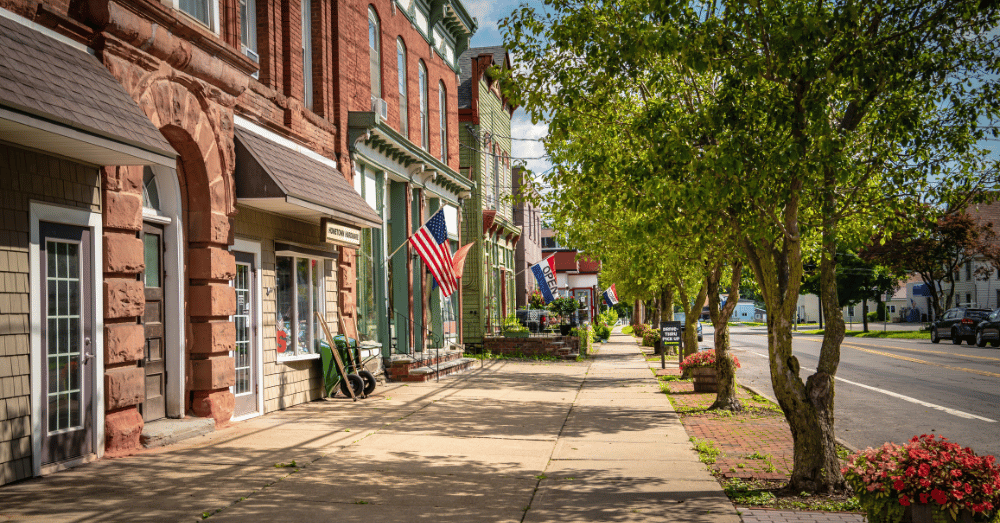Culture, walkability, and convenience. It may seem like city folk may have to give up a lot for small-town life. But many transplants find the benefits of small-town life far outweigh the convenience of life in the big city.
When Lisa Chen left her Chicago high-rise for a house with a yard in suburban Indiana, she braced herself for the usual trade-offs: longer grocery runs, fewer restaurants, maybe some boredom. What she didn’t expect was to fall in love with Saturday mornings at the farmers market—or to realize she’d been missing out on something essential all along.
The Saturday Morning Revelation
Most city transplants assume farmers markets are just expensive grocery shopping with fewer options. But these weekly gatherings reveal themselves as something entirely different: genuine community events where shopping becomes socializing. Farmers markets foster interactions among people of different race, class, age, and lifestyle, with many families viewing a trip to the Saturday morning market as the start of their social weekend.
Unlike the anonymous efficiency of urban supermarkets, small-town markets connect you directly to the people growing your food. Vendors remember your name, offer cooking tips, and become invested in your family’s preferences. It’s the kind of relationship-based commerce that cities lost decades ago.
Commuting Math That Actually Works
Why waste time driving across a big city when you can get wherever you need to be within a matter of minutes? Many transplants discover that their “longer” suburban commutes actually save time. Twenty minutes of smooth highway beats forty minutes of stop-and-go city traffic any day.
In places like Fishers, Indiana, residents enjoy manageable traffic even as their community has grown to over 100,000 people. For a town as surprisingly large as Fishers, the traffic is very manageable. The infrastructure grows with the population rather than constantly playing catch-up.
The Economics of Everything (Not Just Housing)
Everyone knows housing costs less outside major metros. But transplants often discover savings everywhere: car insurance drops due to lower crime rates, utilities cost less, and even groceries can be cheaper. In general, the cost of living is much cheaper in smaller towns than in big cities.
Compared to other cities in the United States, Fishers has a relatively low cost of living index, making it an affordable place to live. Yet residents aren’t sacrificing amenities—they’re accessing them differently, often with better quality and more personal service.
Green Space as Daily Life, Not Weekend Escape
Urban dwellers plan trips to parks. Small-town residents live among them. With over 20 parks and recreational areas spread throughout the city, residents have plenty of opportunities to get outside and enjoy nature. Morning jogs happen on trails, not treadmills. Kids play in actual yards, not just scheduled playground time.
The difference is integration. Nature becomes part of daily routine rather than something requiring special effort or weekend planning.

Small-Town Business: Career Opportunities in Unexpected Places
The assumption that small towns mean limited job prospects is increasingly outdated. With companies like Roche Diagnostics and Navient based here, there are ample opportunities for professionals in fields ranging from healthcare to finance. Many suburban communities have become business hubs while maintaining their residential character.
Proximity to major cities provides access to regional job markets without the daily grind of city living. Remote work has only accelerated this trend, making location choice about lifestyle rather than career limitations.
Community Networks That Actually Function
Perhaps the biggest surprise is how well small-town social networks operate. Because everyone in small communities wants to see one another succeed, there is a strong network of support. This isn’t just neighborly chitchat—it’s practical assistance when you need it.
Need a reliable babysitter? Someone knows someone. Looking for a good contractor? Your neighbor has a recommendation. This kind of social capital functions more efficiently than urban apps and services, often with better results and genuine relationships.
Safety as Foundation, Not Luxury
A newer report shows that violent crimes in cities continue to be nearly double those of small towns. But safety in smaller communities goes beyond statistics. It’s about kids walking to school, doors left unlocked during quick errands, and the peace of mind that comes from knowing your community.
Fishers, Indiana is an exceptionally safe town. Every part of town is safe. This foundation of security changes how families live day-to-day, reducing stress and increasing quality of life in ways that are hard to quantify but easy to feel.
The Learning Curve for Small-Town Life
The adjustment isn’t always smooth. Fewer restaurant options mean more home cooking. Entertainment requires more planning. The Nickel Plate District is a great place to enjoy dining, music, and just a generally fun downtown atmosphere. But it’s not a very large area.
Yet most transplants discover that limitations breed creativity and deeper community connections. When there’s one local coffee shop, it becomes everyone’s coffee shop—and relationships form naturally.
The Real Discovery About Small-Town Living
Growing up, people here wanted to move to New York and L.A., but now they’re coming here because it’s affordable and it’s safe and it has so much to do. The surprise isn’t that small-town living works—it’s discovering that many things people move to cities to find actually exist in more accessible forms in smaller places.
The farmers market becomes a weekly reminder that community has rhythm, neighbors can become friends, and sometimes the best life upgrades come from slowing down rather than speeding up. For transplants willing to adjust their expectations, small-town perks often exceed what any guidebook promised.






More Stories
Las Vegas Police Tesla Cybertruck Fleet: 10 Tesla Cybertrucks for Patrol Duty
What to Look for in a Reliable Road Trip Vehicle
People Dressed as Elvis and Shrek Just Raced Giant Hollowed-Out Pumpkins in Oregon